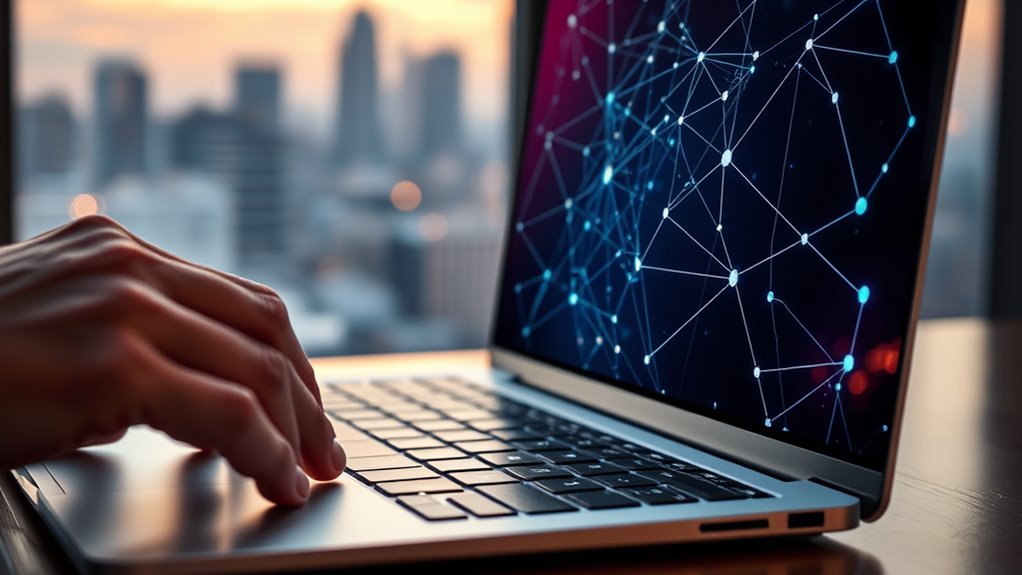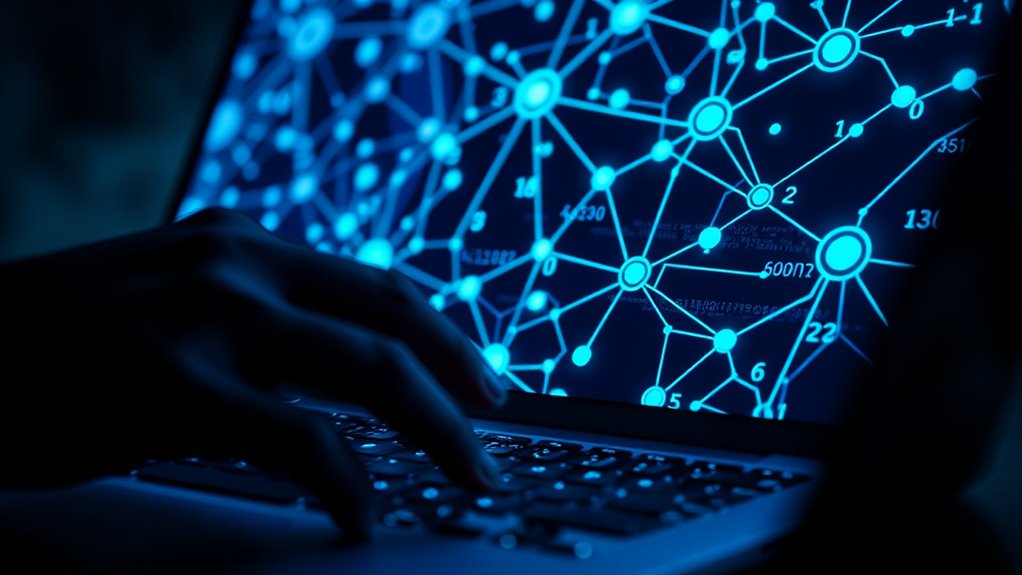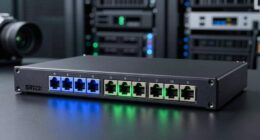VPNs can’t guarantee complete anonymity because they often keep logs, use varying encryption standards, and don’t hide other digital identifiers like cookies or browser fingerprints. Weak encryption or data leaks can still expose your activity, and the provider’s policies may reveal your info to authorities. While VPNs can mask your IP, they’re only one piece of privacy; many other factors affect your anonymity. Keep exploring to understand how to better protect yourself online.
Key Takeaways
- VPN logs, even minimal ones, can potentially identify users if accessed or combined with other data.
- Encryption protocols vary; some are outdated or weak, which can be cracked by advanced attackers.
- VPNs mask IP addresses but do not hide other identifiers like cookies or browser fingerprints.
- Vulnerabilities and leaks at the device or provider level can expose your actual identity despite using a VPN.
- Complete anonymity requires additional privacy tools beyond just using a VPN.

In today’s digital world, maintaining your privacy online can be a challenge, especially with widespread data tracking and surveillance. Many people turn to VPNs, thinking they provide complete anonymity. However, that’s not entirely accurate. VPNs can mask your IP address and encrypt your connection, but they don’t make you entirely anonymous. You need to understand their limitations, especially regarding VPN logging policies and encryption limitations, to grasp why.
First, VPN providers often have logging policies that can compromise your privacy. Some VPNs keep detailed logs of your activity, including connection times, IP addresses, and even websites you visit. These logs can be handed over to authorities or sold to third parties, defeating the purpose of using a VPN for anonymity. Even if a VPN claims to keep no logs, you can’t always verify their policies, and some might retain minimal data that could still be useful for identifying you. Choosing a VPN with a strict no-logs policy is essential, but even then, you can’t assume full anonymity—there’s always a risk that logs could be stored or accessed under certain circumstances.
Next, encryption limitations also impact your level of anonymity. VPNs use encryption to secure your data, making it difficult for outsiders to see what you’re doing online. But encryption protocols aren’t foolproof. Some VPNs rely on outdated or weaker encryption algorithms that can be cracked or bypassed by sophisticated attackers or government agencies. Additionally, VPNs might have vulnerabilities that expose your data despite encryption. This means that while your connection is encrypted in transit, your device or the VPN provider itself might still be vulnerable to leaks or breaches. So, even with a VPN, your online activities aren’t entirely shielded from scrutiny.
Furthermore, a VPN’s ability to anonymize you depends on more than just encryption and logs. Your digital footprint includes other factors, like browser fingerprints, cookies, and metadata, which can still be used to identify you. VPNs mask your IP address but not necessarily all other identifying information. Without additional privacy measures, such as using privacy-focused browsers or anti-tracking tools, your anonymity remains incomplete.
In essence, while VPNs are powerful tools for enhancing privacy, they aren’t a guarantee of complete anonymity. Their effectiveness hinges on transparent, strict logging policies and robust encryption standards, which aren’t always guaranteed. You need to be aware of these limitations and take extra steps if true anonymity is your goal. Recognizing that VPNs are just one piece of a broader privacy strategy can help you make informed choices about how to protect yourself online.
Frequently Asked Questions
Can VPNS Prevent All Forms of Online Tracking?
VPNs can’t prevent all forms of online tracking because of encryption limitations and data retention policies. While they hide your IP address and encrypt your traffic, some trackers still collect data through browser fingerprinting or cookies. Additionally, VPN providers may retain logs based on their policies, which can be accessed or shared. So, for complete anonymity, consider combining a VPN with other privacy tools and practices.
Do VPNS Hide Your Identity From Your Internet Service Provider?
Think of your ISP as a watchful neighbor peeking through the curtains. When you use a VPN, it’s like wearing a disguise—your real identity stays hidden through VPN encryption. While your ISP can see that you’re connected to a VPN server, it can’t see your actual browsing or pseudonym usage. So, yes, a VPN hides your true identity from your ISP, but it doesn’t make you completely anonymous.
Are Free VPNS as Secure as Paid Ones?
Free VPNs often aren’t as secure as paid ones because they usually offer weaker VPN encryption and limited server locations. This can expose your data to potential risks and reduce your privacy. Paid VPNs typically provide stronger encryption protocols and more server options, giving you better security and flexibility. If privacy matters to you, investing in a reputable paid VPN is a smarter choice for all-encompassing protection.
How Do VPNS Impact Internet Speed and Connection Stability?
VPNs can slow down your internet speed and affect connection stability because they route your data through encrypted tunnels, which require extra processing. The encryption strength impacts how much your speed drops—stronger encryption may cause more lag. Additionally, server locations matter; connecting to distant servers can cause delays, while nearby ones usually maintain better connection stability. Choosing a VPN with optimized servers and appropriate encryption can help minimize these issues.
Can VPNS Protect Against Government Surveillance?
VPNs can offer some protection against government surveillance by encrypting your data, which makes it harder for authorities to intercept your online activities. However, if the VPN keeps logs of your data, those records could be accessed or subpoenaed, compromising your privacy. So, while VPN encryption helps hide your information, your protection depends on choosing a provider that doesn’t log your data and maintains strict privacy policies.
Conclusion
Remember, using a VPN doesn’t make you completely anonymous. Even if your IP address is hidden, your activity can still be traced through other means like cookies, browser fingerprinting, or malware. Don’t rely solely on a VPN for privacy—combine it with good habits like clearing cookies and using secure browsers. While VPNs boost your online security, they aren’t a magic shield. Stay vigilant, and don’t assume you’re fully anonymous just because you’re connected to one.









